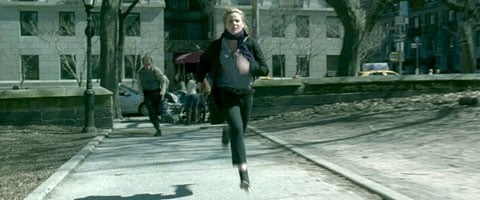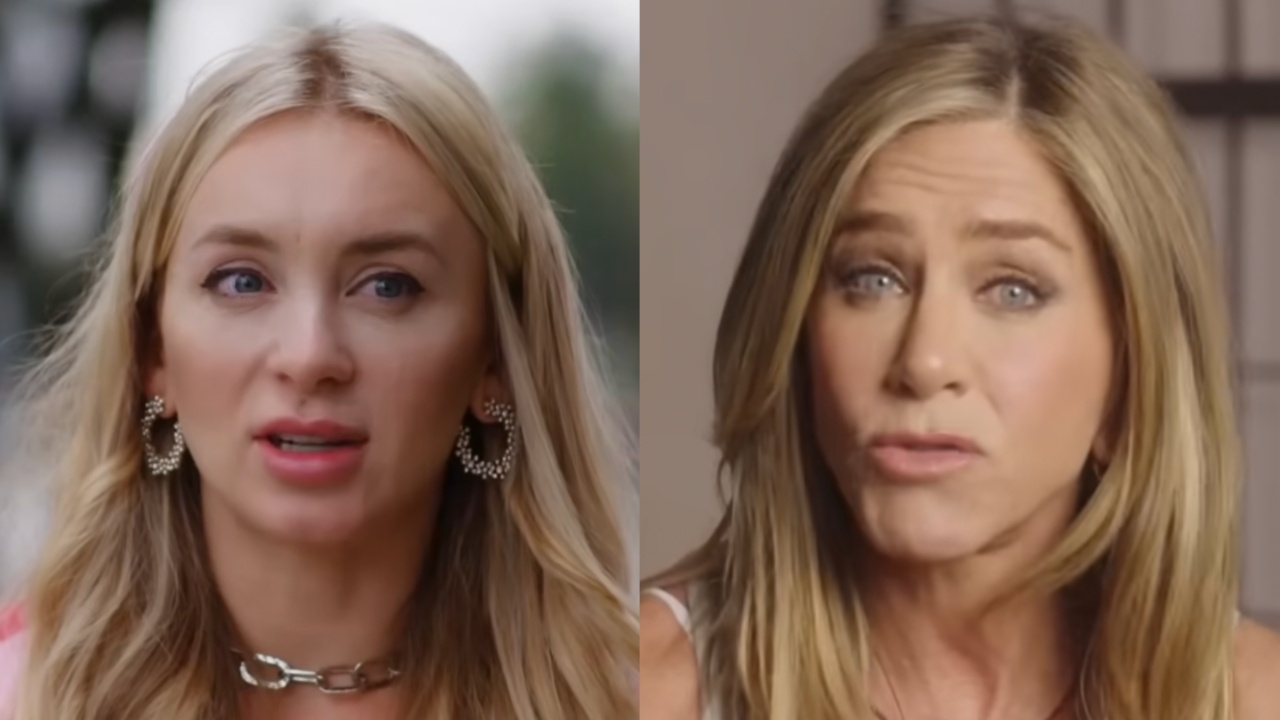Interview: Limitless Star Abbie Cornish

Your Daily Blend of Entertainment News
You are now subscribed
Your newsletter sign-up was successful
When you’ve got a movie about a guy on drugs, what better way to show his softer side than to give him a girlfriend? Well, not only does Abbie Cornish do just that for Bradley Cooper’s character in Limitless, but her own has quite a bit of depth as well – and a heck of a fight sequence.
Cooper is Eddie Morra, a guy who gets hooked on a new illegal drug called NZT. The little clear pill gives the user the ability to use their brain’s full potential ultimately making them smarter and stronger. Cornish’s character, Lindy, is Eddie’s former flame. She ditches Eddie after he hits an all-time low, but the two reunite when Eddie becomes super Eddie courtesy of NZT. However, Eddie’s new life isn’t entirely noble and he gets mixed up with some shady characters and, of course, Lindy gets a little too involved for her liking.
With Limitless hitting theaters on March 18th and Sucker Punch arriving on the 25th, Cornish is in full press mode and came ready to spill on anything and everything from her awe of Robert De Niro to her tactics when choosing roles. Check out all of that and much more in the interview below and be sure to keep an eye out for Cornish’s big moment in the film. You won’t believe the lengths she goes to!

Can you tell us about the character of Lindy and how you came to this project?
Abbie Cornish: Neil Burger sent me the script a while back and he really wanted me to do it and I thought it was a really interesting film and I felt like the character had room to grow and evolve within the scenes that were already written because it is a small part. So, as an actor, you always want to have a journey to go on, you want to have something where you can sink your teeth in and get your hands dirty. And so I felt like that was possible with this role and I was a fan of Bradley Cooper’s. We had never met and through the process of making the film, we became really good friends and I just thought Neil, as a director, would be a very present and caring and collaborative director. The genre of the film was something I hadn’t explored before and also the idea of this drug and what it could do and the possibility that it could really exist in our everyday lives. Even though it’s far-fetched, at the same time it kind of felt possible and real.
How does it feel to have your name above Robert De Niro’s name on the poster?
It’s interesting, I remember when we did the script read-through, the seats were very much like this, but close together so if you imagine the seats being like this (pulls the chairs closer together) and there’s a little card that says “Abbie Cornish,” there’s one here that says “Robert De Niro” and one here that says “Bradley Cooper,” and Bradley sits down and I sit down and we were talking over Bob De Niro’s chair to each other like this and then all of a sudden I look and I saw his placard and I said to Bradley, “Look, in a moment this chair will be filled by Robert De Niro.” I said, “How surreal is that?” He goes, “I know, I can’t believe it,” and it was just that moment of realizing that. We were leaning over his chair and that moment of realizing and all of a sudden we were making sure his chair was ready for him. [Laughs] It was just the most amazing thing for me because, as an actor, his performances are incredible. He’s such a talented and amazing actor and has had such a wonderful career. I think when you meet him, for me, it was like this fog for a moment, or more so, it sounds silly [laughs], but when people talk about near-death experiences, their life flashes before their eyes; when I saw Robert De Niro’s face, all his characters and his performances flashed before my eyes and then that and I saw this man who is Robert De Niro. It is, of course, surreal and wonderful and amazing and awesome.
Your Daily Blend of Entertainment News
Would you ever take NZT yourself?
I think if you could have the ability to take a drug like that without any side effects, without any consequences, without having to face addiction and all that sort of stuff; if you can just go on an adventure with it and feel what that is like. If you could open your mind and utilize 100% of your brain for a moment and feel that. I feel like so many of us have these infinite lists of things to do. I want to learn a language, I want to learn how to play the piano, I want to evolve as a painter, I want to run faster. Whatever it is, I feel like we always have these aims and aspirations and so the idea of taking a drug where within half an hour you could read a novel or within two hours learn a language or learn how to play the piano overnight and read classical music, it’s kind of fascinating. Imagine that. I don’t know why I would ever say no to the concept of that.

There’s also a very serious side to this concept because we’ve got kids today taking drugs to perform better in school. Can you weigh in on that topic?
Yeah, that was something I was talking about today actually. The closest things to it that I can think of are things like Ritalin and Adderall are these drugs that make you focus that are meant to accelerate the process of study and learning and all that. It’s interesting. For me, I very much feel that each is to their own. I feel like you can have a debate about it and you can express your own personal opinion on whether you yourself would want to do it or not do it or whether you’re against it or for it, but at the end of the day, how much can you really judge someone else’s existence and their life and what it is that they choose to do? I think as long as it’s not harming anyone else, I don’t know how much judgment can be placed upon it. I kind of feel like that with a lot of things in life. You know, I’m a vegetarian and very much active in regards to how I feel about animal rights and protecting animals and giving animals a voice, but at the same time, I appreciate and respect other people’s decisions to eat meat. The only thing that I hope is that people are educated, that they’re aware, that they’re living a conscious lifestyle. The only time where my hair stands up on its ends is when someone is very ill-informed, when they’re arrogant, when they haven’t educated themselves and they feel like they know what is right, but at the same time, they haven’t explored the truth of the situation.
How do you choose what roles you do and does it affect you personally if a movie does or does not do well commercially?
I’ll answer the second question first; I feel like I’ve been really blessed with the career that I’ve had and the work that I’ve been able to do as an actor because it originated from a place of films like Somersault where it’s a smaller budget film, great director, very hard working crew and you make that film with your heart and your soul. You don’t even think about what’s going to happen with it. I remember making Somersault and I didn’t even think about what was going to happen with the film when it was actually a film. I just thought about the film we were making.

Was that the first movie you made?
That was the first lead role in a feature film. I’d done a couple small roles in films and I’d done a bit of television, so it felt like the first time. And I remember when that film finally came out and then I got this phone call that said we were going to Cannes, I couldn’t believe it. It’s the most amazing, awesome thing that we went to Cannes, then we went to Tokyo and we went somewhere else. It was so beautiful and so amazing. And so I think that is always alive within me where, for me, the process of making a film is where all the energy goes and what’s really important and I feel that if you’re passionate, if you pour yourself into it and you’re surrounded by people doing the same thing that it doesn’t matter. And not a lot of people have seen Somersault, but I’m so proud of that film. That, for me, I don’t really think of things in those terms. Even with Sucker Punch, it’s a $100 million dollar film, it’s Warner Bros., I’ve never done a film like that, I’ve never been in a movie of that budget and you see big billboards everywhere and it’s on the internet, it’s on the television; it still feels the same to me. The process of making it was the same and I really care about the people I made it with.
Then the first question, choices that I make, yeah, it’s kind of the same thing. I make choices based on my instinct, I make choices based on the story, the character, the people that I’ll be working with. The more I work actually, the more I realize how important it is the people you make the film with.
So the decision-making process doesn’t correlate with the work you’ve just done?
No, not at all. And you know what? In the last couple of years, I’ve worked with some really, really awesome people and developed friendships and relationships that I will take with me for the rest of my life. For example, on Sucker Punch, the five of us girls bonded like you wouldn’t even believe and Zack Snyder and Deb Snyder, just the way they make films. I don’t know if you guys have done conferences with them, but you just get a sense very fast that they’re like a team and so when you work with them, it feels like you’re part of their family. We were all so sad when we wrapped on that film, because we felt like the family was sort of breaking up and I still stay in contact with everyone. For example, Jena Malone, she’s one of my best friends. It’s wonderful that feeling to me. Sometimes I call it play, sometimes I call it work, because it’s not defined just as work because it’s so enriched.
Staff Writer for CinemaBlend.

